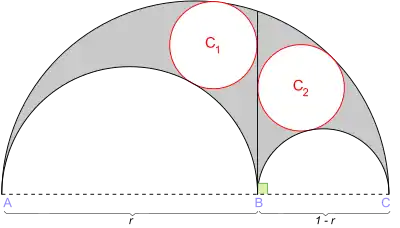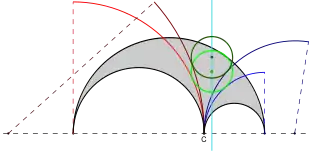Archimedean circle
In geometry, an Archimedean circle is any circle constructed from an arbelos that has the same radius as each of Archimedes' twin circles. If the arbelos is normed such that the diameter of its outer (largest) half circle has a length of 1 and r denotes the radiius of any of the inner half circles, then the radius ρ of such an Archimedean circle is given by

There are over fifty different known ways to construct Archimedean circles.[1]
Origin
An Archimedean circle was first constructed by Archimedes in his Book of Lemmas. In his book, he constructed what is now known as Archimedes' twin circles.
Other Archimedean circles finders
Leon Bankoff
Leon Bankoff has constructed other Archimedean circles called Bankoff's triplet circle and Bankoff's quadruplet circle.


Thomas Schoch
In 1978 Thomas Schoch found a dozen more Archimedean circles (the Schoch circles) that have been published in 1998.[2][3] He also constructed what is known as the Schoch line.[4]
Peter Y. Woo
Peter Y. Woo considered the Schoch line, and with it, he was able to create a family of infinitely many Archimedean circles known as the Woo circles.[5]
Frank Power
In the summer of 1998, Frank Power introduced four more Archimedes circles known as Archimedes' quadruplets.[6]
References
- "Online catalogue of Archimedean circles". Retrieved 2008-08-26.
- Thomas Schoch (1998). "A Dozen More Arbelos Twins". Retrieved 2008-08-30.
- Clayton W. Dodge; Thomas Schoch; Peter Y. Woo; Paul Yiu (1999). "Those Ubiquitous Archimedean Circles" (PDF). Retrieved 2008-08-30.
- van Lamoen, Floor. "Schoch Line." From MathWorld--A Wolfram Web Resource, created by Eric W. Weisstein". Retrieved 2008-08-26.
- Thomas Schoch (2007). "Arbelos - The Woo Circles". Archived from the original on 2014-08-14. Retrieved 2008-08-26.
- Power, Frank (2005). "Some More Archimedean Circles in the Arbelos". In Yiu, Paul (ed.). Forum Geometricorum. 5 (published 2005-11-02). pp. 133–134. ISSN 1534-1178. Retrieved 2008-06-26.
- Okumura, Hiroshi (2019). "Remarks on Archimedean circles of Nagata and Ootoba". In Okumura, Hiroshi (ed.). Sangaku Journal of Mathematics (PDF). 3 (published 2019-11-04). pp. 119–122. ISSN 2534-9562. Retrieved 2019-11-04.